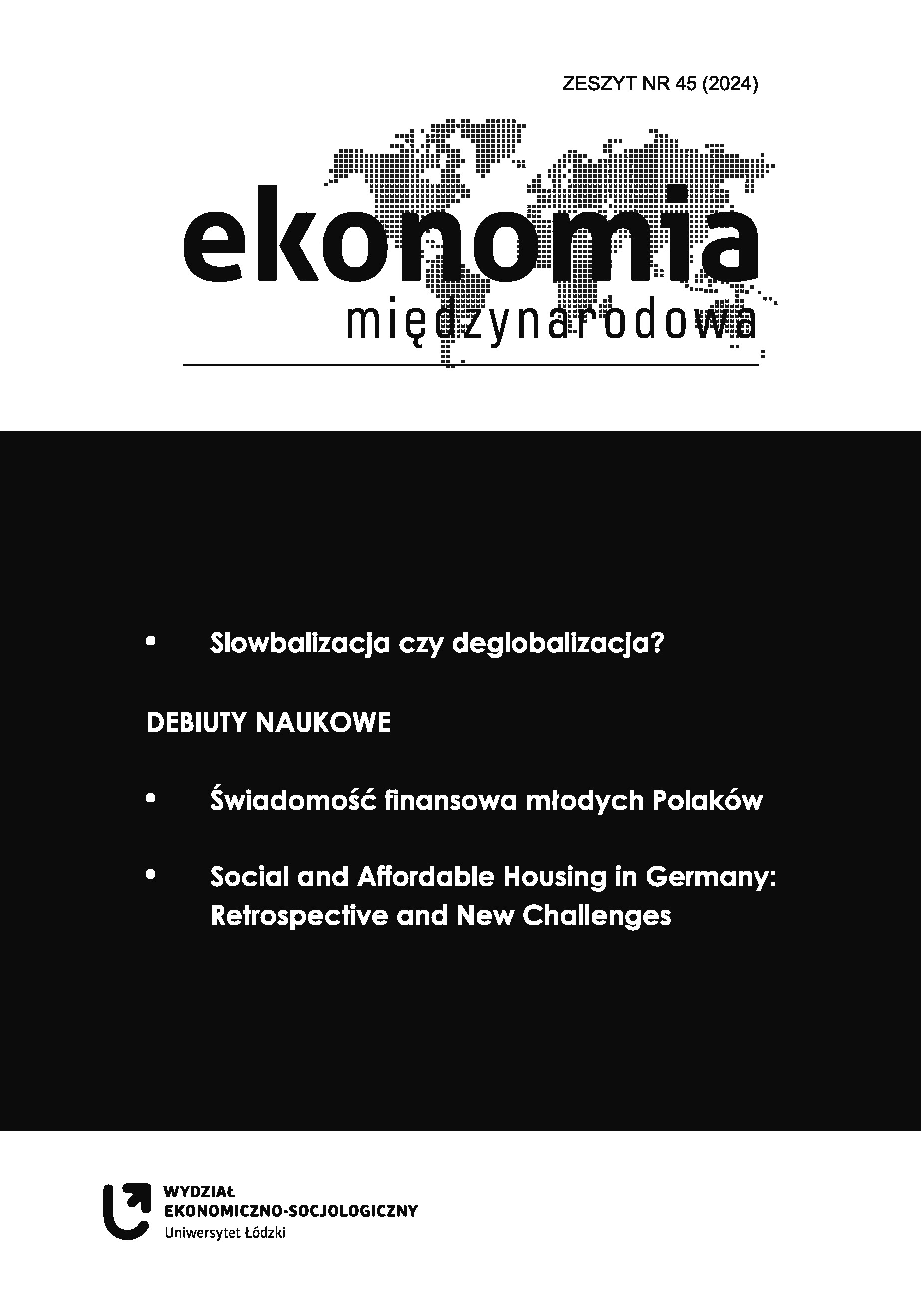Mieszkania społeczne i przystępne cenowo w Niemczech: retrospektywa i nowe wyzwania
DOI:
https://doi.org/10.18778/2082-4440.45.03Słowa kluczowe:
mieszkalnictwo społeczne, niemiecka polityka mieszkaniowa, zagęszczanie zabudowy, prywatni inwestorzy, zrównoważony rozwójAbstrakt
Problemu braku odpowiedniej liczby mieszkań społecznych i przystępnych cenowo nie jest możliwy do rozwiązania wyłącznie przy udziale rządu i władz lokalnych – kluczowi są również prywatni inwestorzy. W ostatnim czasie pojawiły się nowe możliwości dla firm, których kluczem do prowadzenia działalności jest odpowiednia oferta mieszkaniowa w centrach miast. Firmy zajmujące się handlem inwestują na rynku nieruchomości nie tylko w celu budowy nowych filii handlowych, ale również w połączeniu z budownictwem mieszkaniowym. Niemieckie miasta są bardzo zainteresowane tego typu projektami, w których cenna przestrzeń w centrach miast nad jednopiętrowymi sklepami jest zagospodarowywana na mieszkania. Od 2018 r. sieci sklepów detalicznych łączą swoje interesy handlowe z interesami mieszkaniowymi w mieście. Postawione pytanie badawcze brzmi: Czy prywatne inwestycje mogą zwiększyć dostępność mieszkań społecznych i przystępnych cenowo?
Bibliografia
Amin A. (2004), Regions unbound: Towards a new politics of place, “Geografiska Annaler: Series B, Human Geography”, 86(1): 33–44.
Google Scholar
Aus Politik und Zeitgeschichte (APuZ) (2014), Wohnen, 64. Jahrgang, 20-21/2014, 12. Mai 2014, Bundeszentrale für politische Bildung (BPB), Bonn.
Google Scholar
Gliemann K., Szypulski A. (2018), Integration von Flüchtlingen – Auch eine Frage der Wohnunterbringung, [in:] L.C. Kaiser (ed.), Soziale Sicherung im Umbruch: Transdisziplinäre Ansätze für soziale Herausforderungen unserer Zeit (pp. 105–123), Springer Fachmedien Wiesbaden, Wiesbaden.
Google Scholar
Haffner M., Hegedüs J. (2017), The Private Rental Sector in Western Europe, [in:] J. Hegedüs, M. Lux, V. Horváth (eds.), Private Rental Housing in Transition Countries (pp. 1–20), Palgrave Macmillan, London.
Google Scholar
Haufe Online R. (2019), Studie: Deutsche kaufen und mieten vergleichsweise günstig.
Google Scholar
Healey P. (2004), The treatment of space and place in the new strategic spatial planning in Europe. Steuerung und Planung im Wandel: Festschrift für Dietrich Fürst, pp. 297–329.
Google Scholar
Healey P. (2006), Relational complexity and the imaginative power of strategic spatial planning, “European Planning Studies”, 14(4): 525–546.
Google Scholar
Holm A. (2018), Die Rückkehr der Wohnungsfrage, Bundeszentrale für politische Bildung.
Google Scholar
Keßler J., Dahlke A. (2009), Sozialer Wohnungsbau, [in:] A. Krautscheid (ed.), Die Daseinsvorsorge im Spannungsfeld von europäischem Wettbewerb und Gemeinwohl: Eine sektorspezifische Betrachtung (pp. 275–289), VS Verlag für Sozialwissenschaften, Wiesbaden.
Google Scholar
Kofner S. (2003), Die Formation der deutschen Wohnungspolitik nach dem Zweiten Weltkrieg, Teil III, “Deutsche Wohnungswirtschaft”, 55(12): 322–334.
Google Scholar
Kofner S. (2017), Social Housing in Germany: An Inevitably Shrinking Sector, “Critical Housing Analysis”, 4(1): 61–71.
Google Scholar
Kohl S. (2017), Homeownership, Renting and Society, Routledge Taylor & Francis Group, London–New York.
Google Scholar
Madanipour A. (2010), Connectivity and Contingency in Planning, “Planning Theory”, 9(4): 351–368.
Google Scholar
Massey D. (2005), For Space, Sage, London.
Google Scholar
McFarlane C. (2020), De/re-densification, “City”, 24(1–2): 314–324.
Google Scholar
Miciukiewicz K. (2011), Urbanizacja natury: w stronę relacyjnej ekologii miejskiej, “Przegląd Socjologiczny”, 60(2–3): 167–186.
Google Scholar
Noll H.-H., Weick S. (2009), Wohnen in Deutschland: Teuer, komfortabel und meist zur Miete; Analysen zur Wohnsituation und Wohnqualität im europäischen Vergleich, “Informationsdienst Soziale Indikatoren”, 41: 1–7.
Google Scholar
Pestel Institut für Systemforschung e.V., & VHT Institut für Leichtbau | Trockenbau | Holzbau. (2019), Deutschlandstudie 2019, Darmstadt.
Google Scholar
Ringwald J. (2020), Sozialer Wohnungsbau im Kontext deutscher Wohnungspolitik seit 1918: Einflussfaktoren auf die Neubautätigkeit im sozialen Wohnungsbau (B.A), Katholische Hochschule Freiburg.
Google Scholar
Schmitt G. (2017), Die Wohnungsfrage in der Stadterneuerung, [in:] U. Altrock, D. Kurth, R. Kunze, G. Schmitt, H. Schmidt (eds.), Stadterneuerung im vereinten Deutschland – Rück- und Ausblicke (pp. 97–116), Springer Fachmedien, Wiesbaden.
Google Scholar
Tichelmann K.U., Blome D. (n.d.), ISP Eduard, Technische Universität Darmstadt.
Google Scholar
Wekel J., Ohnsorge D., Zdiara A. (2018), Planungspraxis kleiner und mittlerer Städte in Deutschland – Neue Materialien zur Planungskultur, “Projekte”, 51: 251.
Google Scholar
Whitehead C., Scanlon K. (2007), Social Housing in Europe, London School of Economics and Political Science, London.
Google Scholar
Zabel R., Kwon Y. (2021), Evolution of urban development and regeneration funding programs in German cities, “Cities”, 111, 103008.
Google Scholar
Zabel Y., Kwon S. (2019), The transition in social housing in Germany – New challenges and new players after 60 years, “Architectural Research”, 21(1): 1–8.
Google Scholar
Pobrania
Opublikowane
Wersje
- 2024-03-31 - (2)
- 2024-03-31 - (1)
Jak cytować
Numer
Dział
Licencja

Utwór dostępny jest na licencji Creative Commons Uznanie autorstwa – Użycie niekomercyjne – Bez utworów zależnych 4.0 Międzynarodowe.









